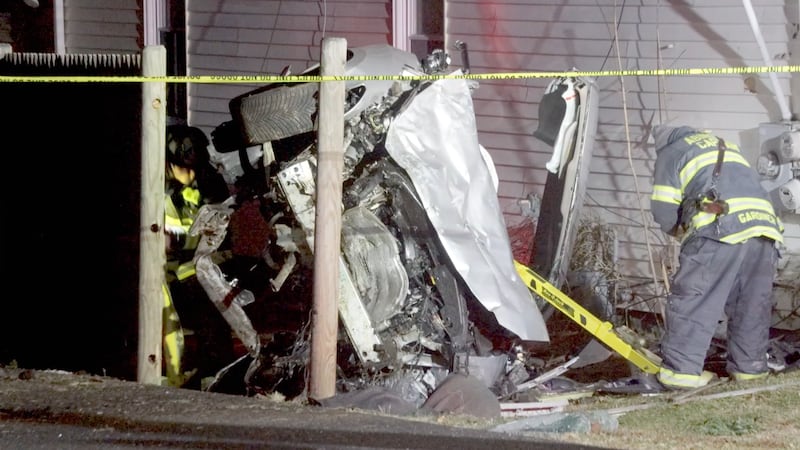BOSTON — A former NFL lineman is sharing his story of addiction, only with Boston 25 News.
He says the league isn't doing enough to address this dirty little secret that's plaguing professional football.
Boston 25 News Anchor Heather Hegedus sat down with this former player, who is now living in New Hampshire, about the action he expects from the league.
Former Giants player Jeff Hatch says he did whatever it took to stay in the game, until his struggles with addiction nearly cost him his life.
"And I'll be honest with you. I've seen a lot of guys die. And I get it. It's tough. That's my story. But it doesn't have to be that way," Hatch told Boston 25's Heather Hegedus.
Hatch's story starts with a guy who had having everything going for him.
He was an All-American at Penn, and was drafted by the Giants in 2002.
Hatch started getting attention in the early 2000's after he was featured in the ESPN documentary "Hey Rookie, Welcome to the NFL."
After the Giants, he went on to play for Tampa Bay.
He was living out his dream, but the physical pain was tremendous.
"Imagine putting your body through a 35 mile an hour car crash 65 times in a day and waking up the next morning knowing you have to do it again," Hatch told us.
He suffered a severe back injury. But it wasn't hard getting his hands on prescription drugs. He says a trainer or a teammate might hand it out like candy, or even a groupie looking for a way to get in with a professional athlete, might supply it.
Hatch explains working through the pain is part of the job.
"That's part of how you gain value in that world. 'This is a guy who can play hurt,' and part of that is taking opiates," Hatch said.
And suddenly Hatch was hooked on painkillers.
"Take 1 to 2 every 4 to 6 hours as needed for pain and then I remember the day I went 'But yeah this will probably help with the emotional pain I'm feeling right now too,' " said Hatch.
HITTING ROCK BOTTOM
Eventually, when he was 26 years old, that injury spelled the end of his career.
"I wanted to end my life I woke up every day hoping I would die. And I tried to drug myself to death," Hatch admitted.
His parents found him in his Tampa Bay townhouse, nearly dead from an overdose.
TURNING PAIN INTO HOPE
But they got him help, and today, Jeff Hatch has been clean for 11 and a half years.
He tours the country, speaking to kids about drugs.
And he works for granite recovery centers in New Hampshire, helping other addicts - mainly from Massachusetts and New Hampshire -- get clean.
"He's a soldier for recovery," said Eric Spofford, Granite Recovery Centers' CEO. "He's tireless day in, day out. He's out there carrying the message. He really is a warrior for this thing."
But Jeff's worried about current NFL players -- especially the ones who get cut.
He says players are suffering in silence and the NFL isn't doing enough to make sure players suffering from addiction get treatment.
He wants the current culture to end -- a culture where he says locker rooms can be candy stores.
"It is shared like candy. I mean I think back on my personal experience there were multiple times, many Heisman Trophy winners where I was like "Hey bro I need a couple" [and they responded] "Here you go brother," said Hatch.
CALLING ON THE NFL FOR CHANGE
Jeff is calling on the NFL to provide recovery coaches and attack the problem aggressively.
He recently stole a moment with commissioner Roger Goodell and asked him to do more.
He says Goodell was receptive, but he acknowledges Goodell is running a big business and hopes Goodell puts his words into actions and now does something about the problem.
He says action needs to be taken soon.
"Not only because these guys are dying, but because these are men that if they can get well and get right will have the opportunity to help so many other people," said Hatch.
The NFL has a partnership with an addiction recovery center in palm beach, Florida and the NFL tells me... Players can receive financial assistance for recovery, from “the Player Care Foundation."
And the NFL players' association also has a substance program, but Hatch says, from what he's seen, players need to seek out that treatment, and, again, he says often players need someone to intervene.
The NFL also gave Boston 25 News a statement that said, in part:
“We have numerous programs led by former NFL players and experts designed to serve, educate and assist current and former players and their families transition into their post-NFL life and provide assistance for their mental, emotion, physical, [and] financial well-being.”
Cox Media Group





